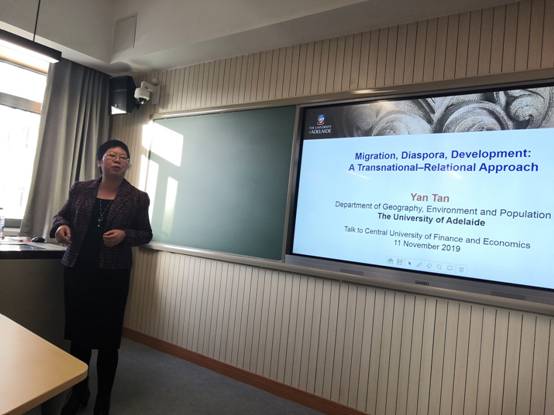2019年11月11日-12日,澳大利亚阿德莱德大学Yan Tan副教授为我校师生讲授人口迁移课程,先后讲授了4次课,主题分别是:移民、侨民、发展:跨国关系;定义和测量侨民的方法论:来自澳大利亚的华侨;亚太地区的气候变化与移民;中国的气候变化与人口迁移:来自中国的新证据。社会与心理学院人口研究所侯佳伟教授、张现苓博士主持,社会与心理学院的人口学硕士研究生、政府管理学院师生共同参与此系列课程授课。本次活动获得中央财经大学引智项目、青年创新团队项目支持。
Yan Tan(谭燕)是阿德莱德大学地理、环境与人口学系的副教授和博士生导师。2011-2015年,她被澳大利亚研究理事会(AustralianResearch Council)授予 “伊丽莎白女王二世研究员” (Queen ElizabethII Fellow)称号。她长期从事人口与环境问题研究,尤其关注人口流动、迁移与发展相互关系问题。目前,她是澳大利亚研究理事会资助的国家级重大课题Transnationalismand Diaspora: Enhancing Demography’s Contribution to Migration and Development的首席研究员。
阿德莱德大学拥有一百四十多年的建校历史,是澳大利亚最富盛名的高等学府之一。自 1874年建校以来,一直以其卓越的教学、学术和研究成功而享有国际盛誉。阿德莱德大学在历史上拥有 5 位诺贝尔奖获得者,培养了110位罗德学者,同时也是澳大利亚“八大名校联盟”成员之一。在最新的 QS 世界大学排名中,阿德莱德大学在全球排名第 106 位。



1. Migration,Diaspora, Development: A Transnational–Relational Approach
Abstract
Recentstudies suggest that the migration–development nexus is best understood from atransnational perspective; but they analyze this nexus in a partial and staticway rather than holistically and dynamically. The framework offered in thispaper is intended to enable an improved transnational understanding. Bringingtogether the changing nature of migration patterns, along with multi-scalartransnational linkages and their determinants, permits a multidimensionalconceptualization of development in terms of strength of diaspora linkages withthe homeland. It also centralizes power relations, demonstrating that linkagesare shaped and strengthened by the dynamic interaction of powers in thetransnational space. Finally, we show how this new framework could assist inanalyzing the relationship between transnational linkages and development, anddiscuss its implications for future research and policy development.
2. Towards aMethodology for Defining and Measuring Diaspora: Examples from theAustralian-based Chinese Diaspora
Abstract
Dataon diaspora is incomplete, inaccurate and inconsistent, with challenges beingexacerbated by the ambiguous and evolving concept of diaspora. Diasporasare not typically included in origin countries’ population census orregistration, despite the fact that transnational studies recognise theirimportant roles in shaping homeland development. To measure and characterisediaspora populations, countries of origin heavily rely on population recordsprovided by destination countries. This paper brings two concepts that haveevolved hand-in-hand – transnationalism and diaspora – to analyse the data ondiasporas obtained from destination countries. Based on Australia’s recentlyintegrated census-migration data, and using Australia-based Chinese diaspora asan example, we demonstrate how the linked data can be used to construct thedemographic and socio-economic profile of a diaspora population on bothpermanent and temporary bases, disaggregated by visa and citizenship, andstratified by geographic distribution. The internal mobility of Chinesediaspora is analysed. Nuanced understandings of themagnitude, characteristics and distributions of diaspora populations (Chinesediaspora in this case) provide a robust baseline for designing effectivediaspora engagement policies.
3. ClimateChange and Migration in the Asia-Pacific Region
Abstract
Therelease of the Stern Review (2006), various versions of assessment reports ofthe Intergovernmental Panel on Climate Change, and the Paris Agreement in 2016have focused global attention on the issue of climate change and reflected thescientific consensus regarding its reality, urgency and significance. TheFourth Assessment of the IPCC (2009) makes frequent reference to the fact thatclimate change will have an influence on migration and notes that ‘(s)tressessuch as increased drought, water shortages and riverine and coastal floodingwill affect many local and regional populations. This will lead in some casesto relocation within and between countries, exacerbating conflicts and imposingmigration pressures’. Indeed, as far back as the IPCC’s first AssessmentReport (1990), it was suggested that migration could possibly be the greatesteffect that climate change may have on society (OSCE 2005). No region of theworld will be more affected by climate change than Asia and the Pacific. Thistalk discusses: 1) what are the major types of hotspots where climate changewill have its greatest effect on migration in the region; 2) how climate changeinfluences and shapes population mobility in the Asia-Pacific region.
4. ClimateChange and Migration in China: New evidence from China
Abstract
Recentcomprehensive studies undertaken by UK Foresight and the IPCC assert thatclimate change will have an increasing impact on human migration patterns overthe subsequent decades. Despite growing scholarship in this field there is alack of adequate empirically grounded knowledge on the complex climate changeand migration nexus. While there has been growing consensus that the way tomove forward is through targeted, theoretically informed cases studies in‘hotspots’ where the impact of climate change is estimated to be distinct, thisresearch is only in its early stages. It seeks to uncover the effects changingclimate has on migration and adaptation strategies, decisions and patterns ofmovement within the context of China’s current socio-economic development andthe challenges in tackling climate change. There is a lack of empiricalevidence in the literature addressing how climate change (including climatevariability and extremes) impacts on migration decision-making and patterns ofmovement in rural and urban settings and at the household level. This studyaims to unravel the climate change and migration nexus by focussing on twohotspots in China, the Yangtze River Delta and the ecologically vulnerableareas of western China. In these two hotspots the complex relationships betweenclimate (environmental) change, mobility and development are examined, thelikely effects of climate variability on both past (spanning 5 years) andfuture migration (decisions and patterns) modelled, and the policy implicationsfor migration, adaptation, and development investigated. The research findings reported in this study add newknowledge and help to improve our understanding of climate change impact andadaptation in China and the development of effective policy.